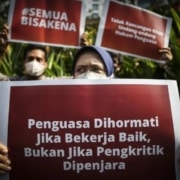
President Joko Widodo had breakfast with Golkar General Chair Airlangga Hartarto at the Bogor Botanical Gardens in January. Photo by Golkar.
The Golkar party’s increased share of the vote in the recent presidential election – from 12.3% in 2019 to 15.3% in 2024 – has reestablished the party as a political force. But controversy over replacing Golkar General Chair, Airlangga Hartarto has reemerged since Prabowo Subianto and Gibran Rakabuming Raka were officially announced the winners.
In October 2024 Prabowo and Gibran will be inaugurated, bringing an end to Joko “Jokowi” Widodo’s reign as president. Their victory has led to a split between Jokowi and the party that backed him for two terms, the Indonesian Party of Struggle (PDI-P). This is because Jokowi’s backing of Prabowo and Gibran, Jokowi’s eldest son, resulted in PDI-P’s presidential candidate, Ganjar Pranowo running last. This means Jokowi will now need to secure a new party vehicle in the next few months – or risk being frozen out of Indonesian politics.
As the sun sets on Jokowi’s presidency and the push to replace Hartarto as general chairman of Golkar gains momentum, Jokowi has reportedly set his sights on controlling this influential party.
Golkar’s leadership uncertainty
The movement to replace Hartarto is not new. In February 2023, he first resisted a call for an extraordinary national congress which sought to install Luhut Binsar Panjaitan, the Coordinating Minister for Economic Affairs, as General Chair of the party.
In July 2023, the call for an extraordinary national conference grew louder after Hartarto was questioned in a corruption investigation about the export of crude palm oil. This hampered his electability and ultimately derailed his hopes of becoming a 2024 presidential candidate. On 30 July 2023, it culminated in the senior Golkar figure Lawrence TP Siburian again calling for the extraordinary national congress, suggesting there were a number of figures who were more worthy of becoming general chairman than Hartarto.
Now that the dust has settled on the 2024 presidential and legislative election, speculation about a leadership challenge has begun again.
The powerbrokers that will determine Gokar’s future
Luhut and Minister for Investment Bahlil Lahadalia – both close confidants of Jokowi – have explicitly expressed interest in taking over from Hartarto but, behind the scenes, there now seem to be three prominent powerbrokers fighting for control of the Golkar party.
The first is billionaire businessman Abu Rizal Bakri, who has thrown his support behind Hartarto. Bakrie was chair of the party from 2009 to 2014 and still has influence. For example, he was able to unite members behind Hartarto to reject the 2023 calls for an extraordinary national congress.
The second is former Indonesian Vice President Jusuf Kalla. Even though Kalla claimed to be on close terms with all the presidential candidates, he officially pledged his support for Anies Baswedan in the 2024 election. Kalla is also a former chair of Golkar from 2004 to 2009 – meaning he still has support from a faction of loyalists.
The third figure is, of course, Jokowi. His interest in Golkar has intensified since the results of the legislative election were finalised. Jokowi’s youngest son, Kaeseng Pangarep, was appointed chair of the small Indonesian Solidarity Party in September 2023 but it failed to win the 4% parliamentary threshold necessary to secure a seat in the Indonesian House of Representatives (DPR). Golkar now looks to have become Jokowi’s Plan B.
Bakrie and Kalla regularly offer public commentary on the future of the Golkar Party, and both have criticized Jokowi’s attempts to seize control of the party. Jokowi, however, has remained tightlipped on the matter, recently dismissing speculation about his bid for control of the party, insisting that for now he is “still chairman of Indonesia”.
Jokowi’s options for taking control
The Golkar party – once the political vehicle of Indonesia’s second and longest-ruling president, Soeharto – is now a ‘big tent’ political party comprised of Indonesian business elites who have shown a strong preference for the spoils of government, rather than opposition.
It will therefore likely continue to support the policies of the new Prabowo-Gibran government, just as it supported Jokowi and Susilo Bambang Yudhoyono when he was in power. These dynamics make the struggle over the General Chair of Golkar particularly interesting to follow.
For now, Jokowi can still potentially influence who will lead Golkar because of the leverage he has as President, but much of that influence will dissipate after his term ends in October.
There are two options at his disposal. The first option is through the Golkar National Conference – the regular mechanism for reviewing and reaffirming the party’s leadership. However, that will not occur until December 2024 – after Jokowi has left office.
The second option at Jokowi’s disposal is the extraordinary national congress mechanism – an irregular spill mechanism that would allow party officials to vote on a no confidence motion against the current leadership and nominate a replacement. If the replacement of the General Chair of Golkar can be initiated through this mechanism, then Jokowi could nominate Gibran as a candidate – or even himself.
The Golkar leadership contest will be another important litmus test for the health of Indonesian democracy in the twilight of Jokowi’s presidency. While the Golkar party has many flaws, it at least appoints a leader through internal mechanisms that reflect the interests of both grassroots cadres and business elites. This is important at a time when many Indonesian political parties have consolidated power in the hands of a single political figure.
The way that Golkar’s leadership is contested could have enduring consequences for Indonesia.


 https://www.antaranews.com/berita/3902502/presiden-joko-widodo-olahraga-dan-sarapan-dengan-airlangga-hartarto
https://www.antaranews.com/berita/3902502/presiden-joko-widodo-olahraga-dan-sarapan-dengan-airlangga-hartarto







